Masani Amman Temple Coimbatore
The Arulmigu Masani Amman Temple, also known as the Anaimalai Masani Amman Temple, is a revered shrine located about 24 km (15 mi) southwest of Pollachi in Coimbatore, Tamil Nadu. Situated at the confluence of the Aliyar River and the Uppar stream, the temple’s history and significance are deeply intertwined with local legend and belief.
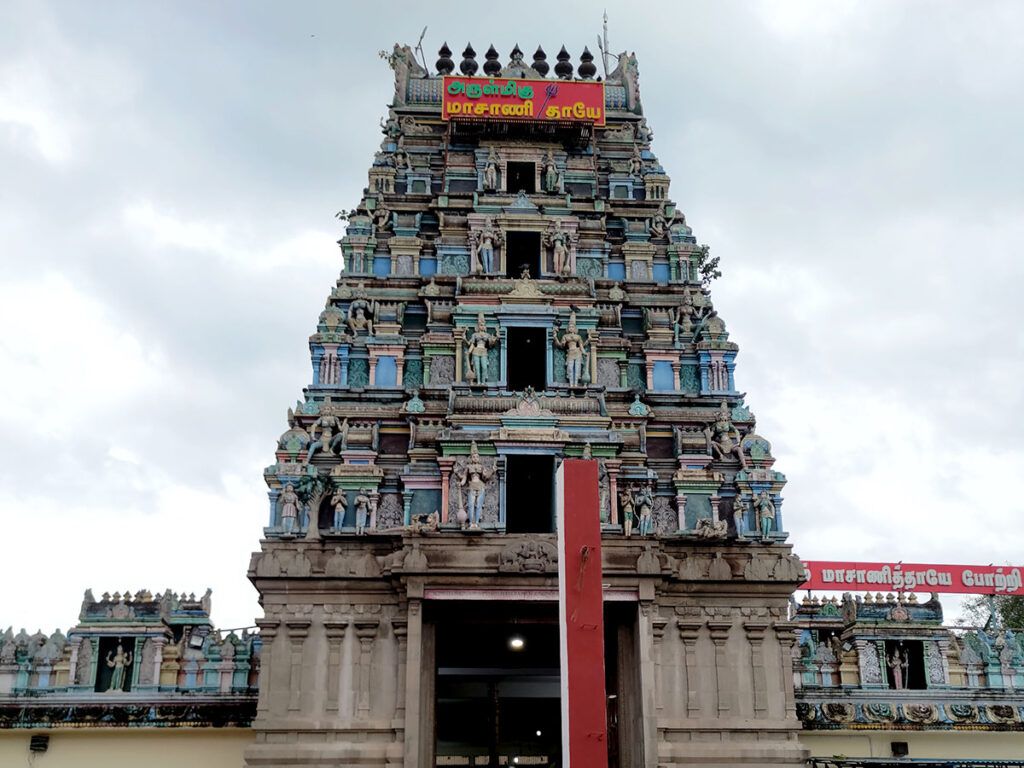
Contents
Temple Origins:
The origin of the temple is shrouded in legend. One popular story tells the tale of a young girl who ate a mango from the orchard of King Nanan. As punishment, the king sentenced the girl to death. The locals protested, but the king remained resolute. On the day of her execution, the girl transformed into a radiant light, promising to return as a powerful goddess and protect the people.
Evolution into a Unique Place of Worship:
The temple initially served as a simple shrine. However, over time, it evolved into a unique place of worship, serving as:
- Welfare Government: The temple became known for addressing the grievances of the people, offering guidance and aid.
- Clinical Dispensary: People flocked to the temple seeking relief from physical ailments, believing in the goddess’s healing powers.
- Court of Justice: The temple acquired a reputation for resolving disputes and upholding justice.
Neethi Kal – The Stone of Justice:
One of the temple’s most intriguing features is the “Neethi Kal,” a stone believed to represent the goddess herself. On the 18th day of each month, a special ritual known as “Mahamuni Pooja” takes place. During this ceremony, devotees pray for justice and resolve disputes. It is believed that the “Neethi Kal” responds to the pleas of the righteous, offering guidance and solutions.
Read More>> Varahaperumal Temple Kumbakonam
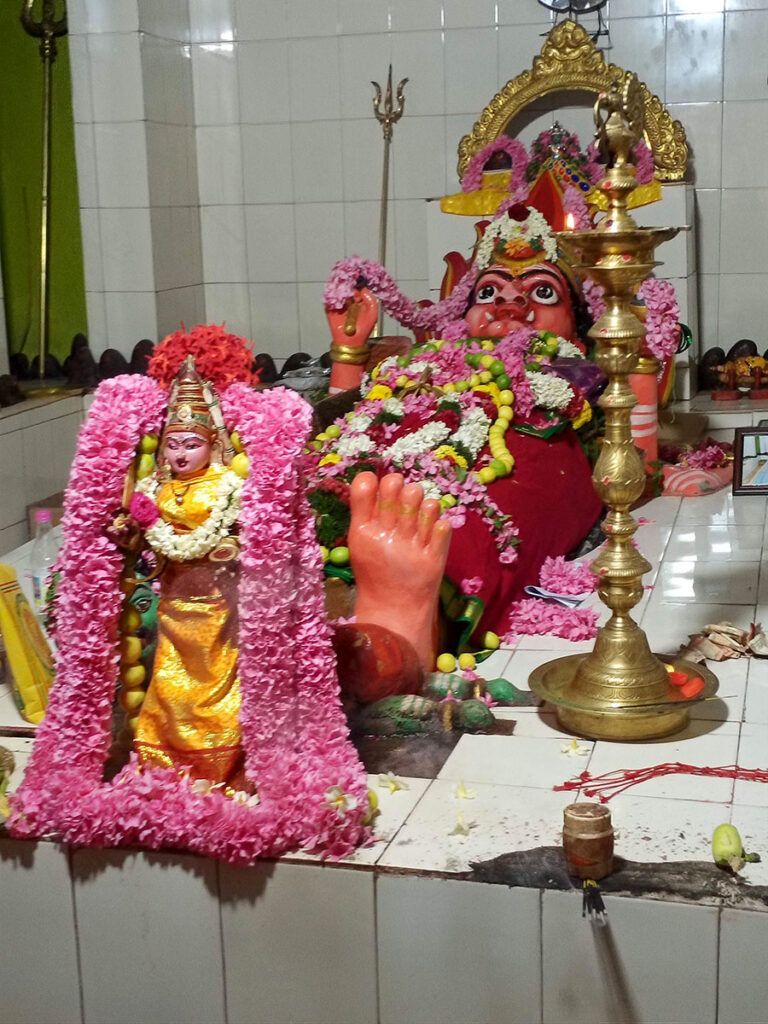
Legends associated with Masani Amman Temple:
1. The Story of the Mango Theft and Injustice:
This legend tells the tale of a young girl who lived in the region during the reign of a cruel king named Nanan. One day, while playing, the girl plucked a mango from a tree belonging to the king’s orchard. The king, enraged by the theft, ordered the girl’s cruel execution.
Unjustly punished and filled with anger and despair, the girl’s spirit rose from the cremation pyre, transforming into a powerful goddess. This goddess, known as Masani Amman, vowed to protect the innocent and fight against injustice.
The temple was built to honor Masani Amman and serves as a reminder of her unwavering strength and compassion. Devotees believe that she grants wishes and protects them from harm.
2. The Story of Lord Rama and the Goddess Parasakti:
Another legend links the Masani Amman Temple to the epic Ramayana. As Lord Rama embarked on his mission to rescue his wife Sita from the clutches of Ravana, he reached the confluence of the Aliyar River and the Uppar stream. There, he learned about the revered Masani Amman and recognized her as a manifestation of the powerful goddess Parasakti.
Lord Rama, seeking her blessings for his arduous journey, sculpted an idol of Masani Amman from the sand found in the crematorium. He offered prayers and sought her guidance before proceeding on his quest.
This legend further strengthens the belief in Masani Amman’s divine power and her association with justice and protection.
Read More>> 10th Century Chakrapani Temple Kumbakonam
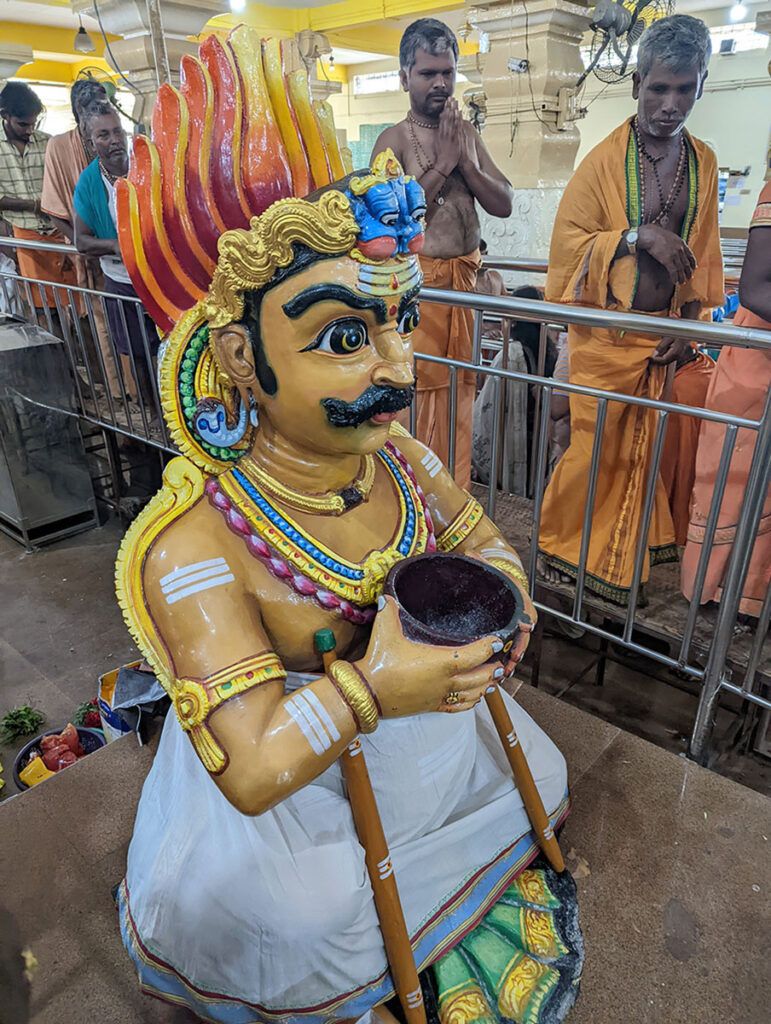
Significance of Masani Amman Temple:
Religious Significance:
- Presiding deity: The temple enshrines Goddess Arulmigu Masani Amman as the presiding deity.
- Unique depiction: Unlike many other representations of goddesses, Masani Amman is portrayed here in a lying posture, measuring 15 feet from head to foot.
- Powerful goddess: Masani Amman is revered as a powerful goddess who grants wishes and protects devotees.
- Curing ailments: It is a popular belief that going around the goddess’s trident can cure any illness.
- Relief from menstrual cramps: Women also seek her blessings for relief from menstrual discomfort.
- Avatar of Mahadevi: Some consider Masani Amman an avatar (manifestation) of Mahadevi, the supreme goddess.
Social Significance:
- Clan deity: Masani Amman is worshipped primarily as a clan deity by certain communities in Tamil Nadu.
- Justice seeker: The temple is considered a court for those seeking justice. People who have lost belongings, properties, or faced betrayal visit the temple to seek justice and resolution.
- Symbol of resistance: Masani Amman is also seen as a symbol of resistance, particularly for women who have been wronged.
Cultural Significance:
- Architecture: The temple boasts Dravidian architecture with intricate carvings and sculptures, adding to its visual appeal.
- Festivals: The temple hosts various festivals throughout the year, attracting large crowds and showcasing vibrant cultural traditions.
- Tourist attraction: The temple’s unique architecture, powerful deity, and cultural significance make it a popular tourist destination in Coimbatore.
Read More>> Nageswaran Temple Kumbakonam: Abode of Lord of Divine Serpents
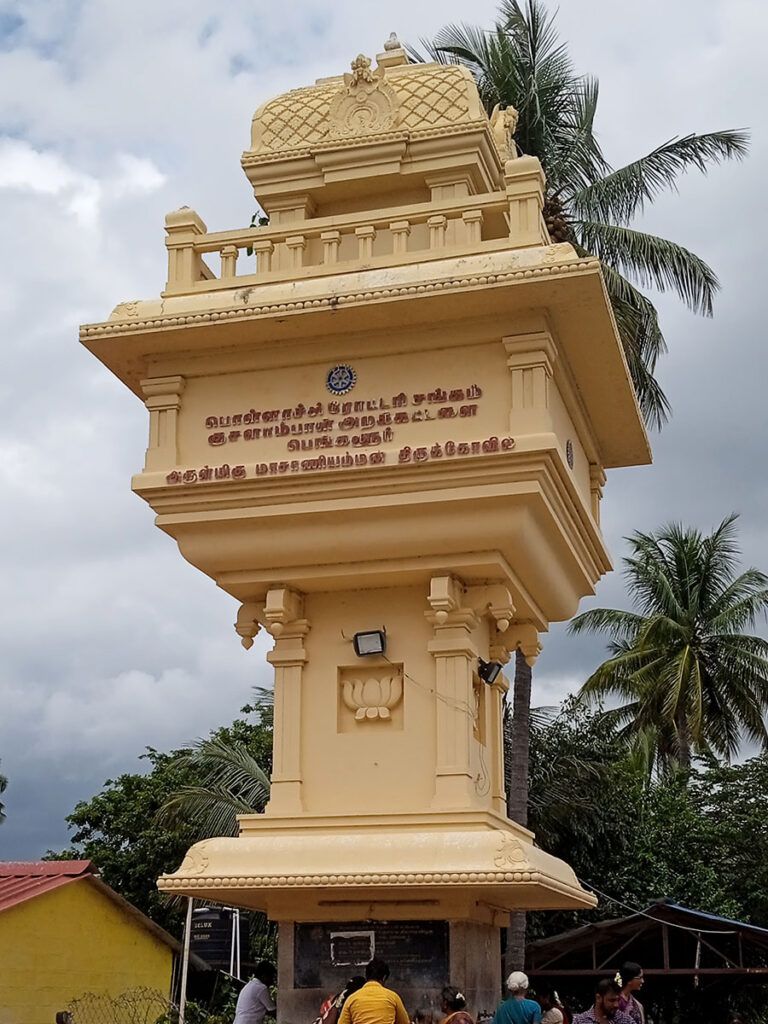
Myths and beliefs at Masani Amman Temple:
Popular Beliefs and Practices:
- Curing Illnesses: It is widely believed that Masani Amman has the power to cure any illness. Devotees perform circumambulations around her trident, seeking relief from ailments.
- Protection for Women: Masani Amman is considered the protector of women, especially those facing pregnancy difficulties, menstrual cramps, and other health issues.
- Justice and Fairness: The temple also houses a “neethi kal” (stone of justice), where devotees seek divine intervention in resolving disputes and seeking justice.
Unique Offerings:
Devotees offer various items to Masani Amman, including coconuts, flowers, and incense. One unique offering is the “karagam”, a pot filled with water and decorated with flowers and fruits. This offering is believed to bring prosperity and good luck.
Read More>> Shivoham Shiva Temple: 65 Foot Tall Statue of Lord Shiva
Masani Amman Temple Timing and Rituals:
The Masani Amman Temple is open from 6:00 AM to 12:30 PM and from 4:30 PM to 8:30 PM every day.
Here are some of the rituals performed at the Masani Amman Temple:
Mayana Puja: This is a very famous festival celebrated in the month of February-March on the night of Maha Shiva Ratri. The word “Mayana” refers to the burial ground.
Elumbukkadi: This ritual is also celebrated on the same day of Maha Shivaratri on the banks of the Noyyal River for the Goddess Angalamman, who is considered as the guardian angel of Masani Amman.
Adi Peruku: This festival is celebrated in the month of July-August to mark the beginning of the monsoon season.
Chithirai Kani: This festival is celebrated in the month of April-May to mark the Tamil New Year.
Needhikal: This is a stone of justice where devotees offer ground chillies to seek resolution to their problems and demand justice.
Read More>> Pancharama Kshetras: Kartikeya Breaks the Shivalinga into 5
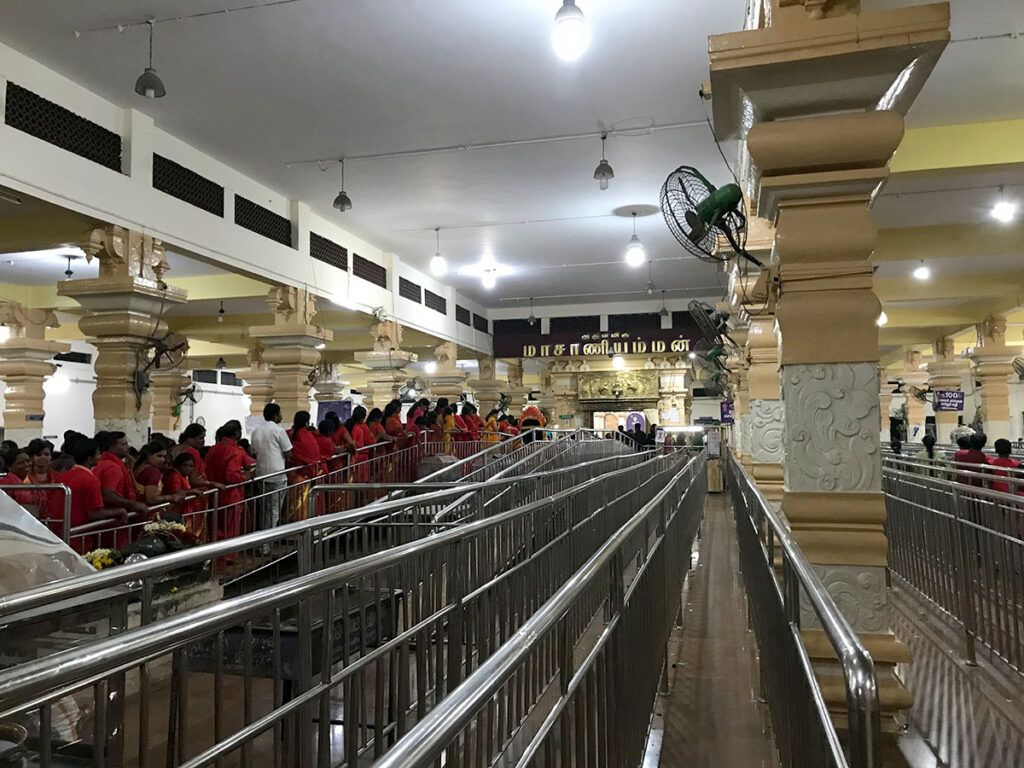
Places to visit near Masani Amman Temple:
- Topslip:
- Topslip is a popular destination near Anaimalai known for its wildlife sanctuary. It is part of the Anamalai Tiger Reserve and offers opportunities for wildlife safaris.
- Parambikulam Wildlife Sanctuary:
- Located nearby, Parambikulam Wildlife Sanctuary is another excellent destination for nature and wildlife enthusiasts. The sanctuary is known for its diverse flora and fauna.
- Valparai:
- Valparai is a hill station located not too far from Anaimalai. It is surrounded by tea estates, dense forests, and waterfalls, providing a serene and picturesque atmosphere.
- Aliyar Dam:
- Aliyar Dam is a scenic spot with a dam and gardens. It’s a great place for a relaxing day picnic. The surrounding hills and the Aliyar Reservoir add to the beauty of the area.
- Monkey Falls:
- Monkey Falls is a natural waterfall located near Pollachi. It is surrounded by lush greenery and is a good spot for a refreshing dip.
- Anamudi Shola National Park:
- A bit farther away, Anamudi Shola National Park is known for its rich biodiversity and is a great place for nature lovers and birdwatchers.
- Thirumoorthy Hills:
- Thirumoorthy Hills is known for the Thirumoorthy Dam and Temple. It’s a serene location with a beautiful temple dedicated to Lord Murugan.
- Siruvani Waterfalls:
- About 37 km from Anaimalai, Siruvani Waterfalls is famous for its sweet water. It’s a great place to visit, especially during the monsoon season.
- Marudhamalai Temple:
- Located in Coimbatore, Marudhamalai Temple is a popular hill temple dedicated to Lord Murugan. The temple offers a panoramic view of the surrounding landscape.
- Dhyanalinga Temple:
- Situated near Coimbatore, the Dhyanalinga Temple is a unique meditative space and an architectural marvel. It attracts people seeking spiritual experiences.
FAQ:
1. Where is the Masani Amman Temple located?
There are several Masani Amman Temples in Coimbatore district. The most famous one is located in Anaimalai, which is about 24 km (15 mi) southwest of Pollachi.
2. What is the significance of the temple?
The Masani Amman Temple is dedicated to the goddess Masani Amman, a powerful and fierce manifestation of Shakti. The temple is built on a cremation ground, and the sanctum of Goddess Amman is also built upon the cremation area. This is why the Amman is called Masani Amman, meaning “Goddess of the Cremation Ground”.
The temple is considered to be a powerful place for seeking justice and overcoming obstacles. People who have been wronged or cheated often come to the temple to pray for revenge on their enemies. The temple is also believed to be beneficial for those seeking good health and prosperity.
3. What are the timings of the temple?
The Masani Amman Temple is open from 5:00 AM to 9:00 PM every day. However, on New Moon days, the temple is open for 24 hours.
4. What are the offerings made to the goddess?
The most common offerings made to Masani Amman are coconuts, lemons, jaggery, and red silk sarees. Devotees also offer flowers, fruits, and incense.
5. What are the festivals celebrated at the temple?
The main festival celebrated at the Masani Amman Temple is the annual Aadi Perukku festival, which falls in the Tamil month of Aadi (July-August). During the festival, the temple is decorated with flowers and lights, and special prayers are offered to the goddess.
6. What are the facilities available at the temple?
The Masani Amman Temple has a large prayer hall, a spacious courtyard, and several shrines dedicated to other deities. The temple also has a small shop that sells puja items and souvenirs.
7. How can I reach the temple?
The Masani Amman Temple is located in Anaimalai, which is about 24 km (15 mi) southwest of Pollachi. The easiest way to reach the temple is by car or taxi. There are also several buses that run from Pollachi to Anaimalai.
8. What are some of the things to do near the temple?
There are several things to do near the Masani Amman Temple, including:
- Visiting the Anaimalai Tiger Reserve
- Trekking in the Anaimalai Hills
- Visiting the Valparai Tea Estate
- Boating on the Aliyar River
For additional information visit Official website: https://anaimalaimasaniamman.hrce.tn.gov.in/
How to reach Masani Amman Temple:
By Air:
The nearest airport is Coimbatore International Airport (CJB), which is well-connected to major cities in India. Once you reach the airport, you can hire a taxi or use other local transportation to reach Anaimalai.
By Train:
The nearest major railway station is Coimbatore Junction. From there, you can take a taxi or use local buses to reach Anaimalai. The Pollachi Junction is another railway station closer to Anaimalai, and you can consider it if there are direct train services available.
By Road:
- From Coimbatore:
- Anaimalai is approximately 40-50 kilometers away from Coimbatore.
- You can hire a taxi or use local buses to reach Anaimalai from Coimbatore.
- From Pollachi:
- Anaimalai is relatively close to Pollachi.
- You can hire a taxi, use local buses, or drive yourself to Anaimalai from Pollachi.
- By Bus:
- Regular bus services operate between Coimbatore, Pollachi, and Anaimalai.
- You can take a bus from the central bus stand in Coimbatore or Pollachi to reach Anaimalai.
- By Car:
- If you are driving, you can use navigation apps or maps to guide you from Coimbatore or Pollachi to Anaimalai. The roads are generally well-maintained.

One Comment